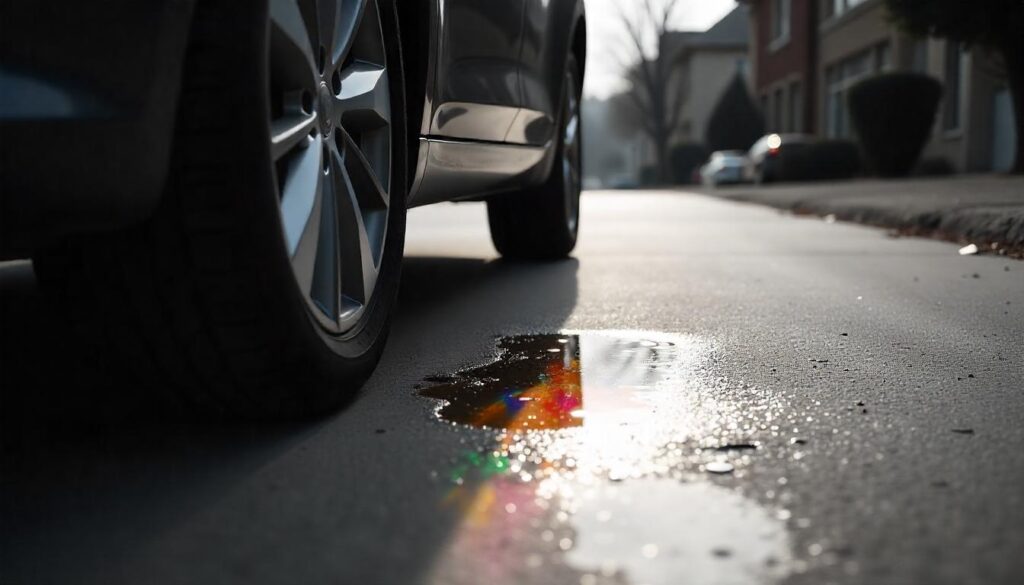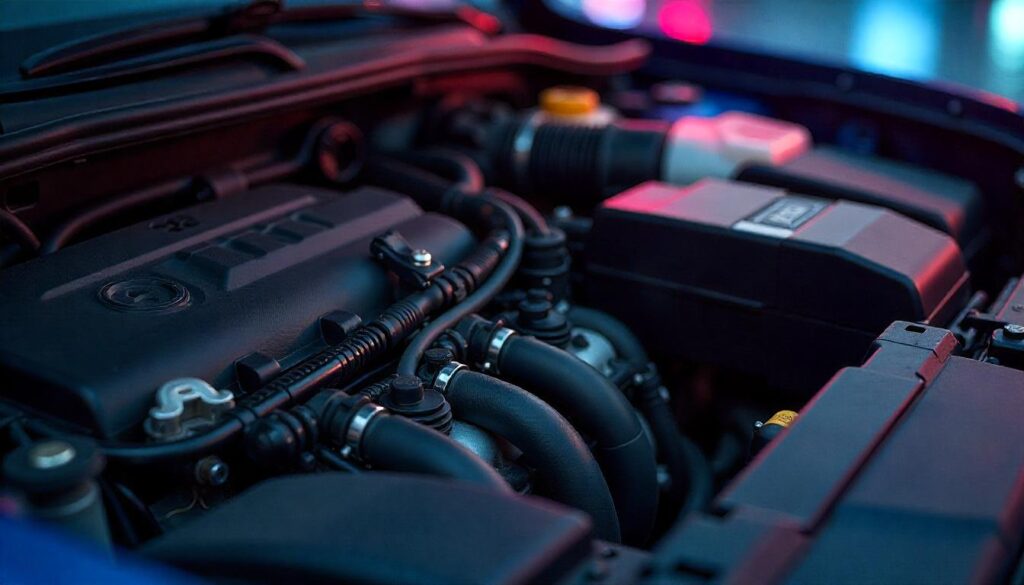Have you ever stepped into your car and noticed that unmistakable gasoline smell lingering in the air? why does my car smell like gas ? It’s more than just a minor inconvenience—it could signal a problem that might be dangerous if ignored. In this article, we’ll explore the many reasons behind that pungent odor, help you diagnose the issue, and provide actionable tips to fix it. Whether it’s a minor hiccup or a serious safety hazard, we’ve got you covered.
Table of Contents
What Does a Gasoline Odor Mean?
When you detect the scent of gas, your car might be trying to tell you something isn’t right. Unlike the typical smell of diesel or exhaust fumes, gasoline is highly volatile and can create immediate concerns. From health risks to fire hazards, a gas smell should never be dismissed.
- Potential Fuel Leak: A strong gas odor often points to a leak in the fuel system. Even a small leak can be dangerous, leading to reduced fuel efficiency and increasing the risk of a fire.
- Faulty Emissions System: The evaporative emissions (EVAP) system captures fuel vapors before they escape into the atmosphere. When something goes wrong with this system, those vapors can escape, resulting in that telltale gas smell.
- Engine Problems: Malfunctions in the engine’s fuel injection system, issues with fuel filters, or a malfunctioning gas cap can also create an odor of gasoline.
Ignoring these signals can lead to bigger problems. A fuel leak, for example, might not only damage your engine but could also pose a serious risk if the leaked gasoline comes into contact with an ignition source.
Common Causes of a Gasoline Smell
Let’s break down the most common reasons your car might be emitting a gasoline odor:
1. Fuel System Leaks
Fuel Line Issues:
Cracks or wear in the fuel line can cause gasoline to seep out. Over time, the constant exposure to fuel can degrade the line’s integrity, leading to leaks that might be hard to detect until the smell becomes pronounced.
Fuel Injector Leaks:
Fuel injectors are designed to spray gasoline into the engine in precise amounts. However, if an injector becomes faulty or the seal wears out, gasoline can leak, both reducing engine performance and creating a hazardous environment.
2. Problems with the Evaporative Emissions System (EVAP)
What is the EVAP System?
The EVAP system is responsible for capturing fuel vapors from the gas tank and storing them until they can be safely burned in the engine. If this system malfunctions, the fuel vapors escape, leaving behind a noticeable gas smell.
Common EVAP Issues:
- Faulty Canister Vent: The charcoal canister in the EVAP system absorbs fuel vapors. A malfunctioning vent valve can prevent proper recycling of these vapors.
- Broken or Disconnected Hoses: Over time, the hoses that carry fuel vapors may crack or become disconnected, allowing vapors to leak into the engine bay or cabin.
3. Loose or Faulty Gas Cap
It might sound trivial, but a loose, missing, or damaged gas cap can result in gasoline vapors escaping. The gas cap seals the fuel system, and if it isn’t secured properly, the pressure in the tank may drop, leading to vapor leaks. Regularly checking and replacing the gas cap is one of the simplest yet most effective maintenance steps.
4. Issues with the Fuel Tank
Fuel Tank Integrity:
A compromised fuel tank, whether due to corrosion or physical damage, can also be a source of leaks. Even a small crack or hole can allow gasoline to escape slowly, creating a persistent odor.
Fuel Tank Venting Problems:
Many modern cars have a venting system within the fuel tank. If the vent is blocked or malfunctioning, it could force gas vapors to escape in unexpected ways.
5. Engine and Exhaust System Malfunctions
Faulty Fuel Injection:
If the fuel injection system is over-fueling the engine or failing to atomize the gasoline properly, it can result in unburned fuel, which contributes to a gasoline odor. This issue not only affects the smell but can also lead to poor engine performance and increased emissions.
Catalytic Converter Issues:
While more commonly associated with a rotten egg smell, a malfunctioning catalytic converter can sometimes contribute to abnormal exhaust odors, including that of gasoline.
6. Other Possible Causes
Spilled Fuel:
Sometimes, the problem may be as simple as spilled fuel from refueling. If gasoline splashes onto the engine bay or undercarriage, it can evaporate and create a noticeable odor until it fully dissipates.
Fuel Filter Blockage:
A clogged fuel filter can lead to improper fuel flow and may force the engine to work harder, resulting in an unburned fuel smell. Regular replacement of the fuel filter is an essential maintenance step.

The Risks of a Gasoline Odor
Understanding the risks associated with a gasoline odor is crucial. It’s not just about an unpleasant smell; the implications can be serious:
- Fire Hazard: Gasoline is extremely flammable. Even a small leak in a confined space can pose a fire risk, especially if it comes into contact with hot engine components or electrical sparks.
- Health Risks: Prolonged exposure to gasoline fumes can be harmful. Inhaling these vapors may lead to headaches, dizziness, nausea, and even long-term health issues.
- Environmental Impact: Fuel leaks contribute to environmental pollution. Gasoline that evaporates into the atmosphere or leaks into the ground can have detrimental effects on air and water quality.
How to Diagnose the Source of the Gasoline Smell
Diagnosing the problem early can save you money, time, and potential safety hazards. Here’s how you can systematically approach the issue:
1. Conduct a Visual Inspection
Start by visually inspecting the engine bay and undercarriage. Look for any signs of a fuel leak, such as wet spots or drips. Check the fuel lines, the gas tank, and the area around the fuel injectors. A flashlight and a mirror can help you reach those hard-to-see areas.
2. Smell Test
Carefully sniff around the vehicle. While it might be tempting to pinpoint the exact location, remember that gasoline fumes can be dangerous if inhaled in high concentrations. If you suspect a particular area, it’s best to use caution or get professional help.
3. Check the Gas Cap
Ensure the gas cap is secure. Remove it and inspect the rubber gasket for any signs of wear, cracks, or damage. A faulty gasket can easily be the culprit behind the odor.
4. Use a Fuel Leak Detector
Fuel leak detectors are available at most automotive stores and can help identify even small leaks in the fuel system. These devices are especially useful if the leak is minor and difficult to see with the naked eye.
5. Monitor Engine Performance
Pay attention to any changes in how your engine performs. Issues like misfires, a rough idle, or decreased fuel efficiency can all be indicators of fuel system problems.
DIY Fixes and When to Call a Professional
While some causes of a gasoline odor can be addressed with simple DIY fixes, others require professional attention. Here’s a guide to help you decide:
DIY Fixes
- Replace or Tighten the Gas Cap:
Often, the simplest solution is the correct one. If your gas cap is loose or damaged, simply replacing it might solve the problem. - Inspect and Replace Fuel Filter:
Regular maintenance, including the replacement of the fuel filter, can help ensure that your fuel system is clean and functioning properly. - Check for Spilled Fuel:
If you notice spilled fuel around the engine bay, clean it up thoroughly. Sometimes, a simple cleaning and drying process will eliminate the odor.
When to Call a Professional
- Persistent Fuel Leaks:
If you detect a continuous gasoline odor and can’t locate the source, it’s critical to have a professional mechanic inspect your vehicle. Fuel leaks can be dangerous and should be addressed immediately. - Complex EVAP System Issues:
The EVAP system is intricate, and diagnosing issues within it may require specialized tools and expertise. A professional diagnostic can pinpoint the problem quickly and accurately. - Engine Performance Problems:
If your engine is showing signs of distress (such as misfires or rough idling) in addition to the gasoline smell, professional intervention is necessary to prevent long-term damage.
Preventing Gasoline Odor in the Future
Prevention is always better than cure. Here are some best practices to keep your car in top condition and prevent gasoline odors:
Regular Maintenance
Scheduled Inspections:
Adhere to your car’s recommended maintenance schedule. Regular inspections of the fuel system, including fuel lines, injectors, and the EVAP system, can help catch issues before they become serious.
Routine Cleaning:
Keep your engine bay clean. Removing debris and spilled fuel residues not only helps in detecting leaks but also ensures that your vehicle operates efficiently.
Quality Parts
Use OEM Parts:
Whenever possible, use Original Equipment Manufacturer (OEM) parts when replacing components in the fuel system. OEM parts are designed to meet the specific standards of your vehicle and often last longer than aftermarket alternatives.
Regular Replacement of Consumables:
Items like the gas cap, fuel filters, and hoses wear out over time. Replacing these components at recommended intervals can save you from larger problems down the road.
Monitoring and Detection
Fuel Leak Detectors:
Consider investing in a fuel leak detection device, especially if your vehicle is older or has high mileage. These devices can provide early warnings of leaks, allowing you to address them before they escalate.
Dashboard Alerts:
Modern cars often come equipped with sensors and warning systems that alert you to potential issues with the fuel system. Don’t ignore these alerts—addressing them early can prevent expensive repairs later.

Deep Dive: The Science Behind Fuel Vapors and Odors
Understanding the chemical makeup of gasoline can also shed light on why the odor is so pervasive and alarming.
The Chemistry of Gasoline
Gasoline is a blend of various hydrocarbons. Its volatility means that even at low temperatures, gasoline can evaporate, releasing fumes into the air. These fumes are not only responsible for the strong odor but also for the health hazards associated with inhaling them.
Evaporative Emission Control
The EVAP system is designed to trap these hydrocarbons before they escape into the atmosphere. When it functions correctly, it reduces air pollution and improves your vehicle’s fuel efficiency. However, if any component within this system fails—be it the charcoal canister, hoses, or valves—the balance is disrupted, and vapors can leak out.
Impact on Engine Efficiency
When gasoline is not delivered properly to the engine due to leaks or injector problems, it can lead to inefficient combustion. This inefficiency not only produces a distinct smell but can also decrease your car’s performance and fuel economy.
Real-World Case Studies
Case Study 1: The Loose Gas Cap Fix
A common issue seen by mechanics involves customers complaining about a persistent gasoline odor. In one instance, a vehicle owner noticed the smell after every refueling. The culprit turned out to be a loose gas cap that didn’t seal properly. Once replaced, the odor disappeared immediately. This case underlines how even the simplest fix can have a major impact on your car’s health.
Case Study 2: Diagnosing a Fuel Injector Leak
Another case involved a car that began to exhibit poor performance alongside a strong gasoline odor. A thorough inspection revealed that one of the fuel injectors was leaking. After replacing the faulty injector and cleaning the engine bay, not only was the odor eliminated, but the vehicle’s performance improved significantly. This example highlights the importance of regular maintenance and timely diagnosis of fuel system issues.
Case Study 3: EVAP System Malfunction
In a more complex scenario, a car was brought in with no obvious signs of a leak yet had a persistent gas smell. Technicians conducted a detailed diagnostic test and discovered that the EVAP system was not functioning correctly due to a defective vent valve. After repairing the EVAP system, the odor was completely resolved, and the vehicle passed emissions testing with flying colors.
FAQs About Gasoline Odors
Q: Is it safe to drive if my car smells like gas?
A: It depends on the severity of the leak or malfunction. A minor gas cap issue may not pose an immediate threat, but persistent odors, especially when accompanied by performance issues, should be addressed immediately.
Q: Can a gasoline smell affect my engine’s performance?
A: Yes, issues like fuel injector leaks or a malfunctioning EVAP system can lead to inefficient combustion, which in turn affects your engine’s performance and fuel efficiency.
Q: What’s the easiest fix for a gasoline smell?
A: Often, simply ensuring your gas cap is secure and in good condition is the easiest and most cost-effective fix. However, if the problem persists, further diagnosis is essential.
Q: How can I prevent future gasoline odors?
A: Regular maintenance is key. Ensure that your fuel system is inspected routinely, replace worn components, and address any dashboard alerts or performance issues as soon as they arise.
Q: When should I see a mechanic?
A: If you notice a continuous gasoline smell, unexplained drops in fuel efficiency, or any unusual engine behavior, it’s best to have your car inspected by a professional immediately.
Conclusion
A gasoline odor in your car is more than just an annoyance—it’s a warning sign. From fuel system leaks to EVAP system malfunctions and even something as simple as a loose gas cap, there are multiple reasons why your car might be giving off that telltale scent. The risks associated with these issues, such as fire hazards and health problems, make it essential to diagnose and fix the problem promptly.
By understanding the common causes, learning how to perform initial diagnostics, and knowing when to call a professional, you can ensure that your vehicle remains safe and efficient. Regular maintenance, high-quality parts, and prompt attention to warning signs are the cornerstones of preventing such issues. Remember, a small fix today can save you from a major disaster tomorrow.
If you ever find yourself wondering why your car smells like gas, refer back to this guide. It’s designed not only to help you troubleshoot the issue but also to empower you with the knowledge to maintain your vehicle’s optimal performance. Whether you choose to tackle a simple fix yourself or enlist the help of a professional, don’t ignore the warning signs—a safe car is a happy car.
By following these steps and maintaining a proactive approach to car care, you’re not only protecting your investment but also ensuring the safety of everyone on the road. Stay vigilant, keep up with regular maintenance, and always trust your instincts when something feels off. Your car, your safety, and the environment will thank you.
By integrating insights from Cars.com, Firestone Complete Auto Care, and Chapel Hill Tire, this comprehensive guide aims to be the go-to resource for any driver facing the mystery of a gasoline odor. The blend of actionable advice, real-world examples, and a clear diagnostic path makes it a must-read for anyone serious about vehicle maintenance.
Take action now—inspect your car, perform regular maintenance, and don’t hesitate to call in a professional when necessary. Your car’s health is in your hands, and with the right approach, you can keep it running safely and efficiently for years to come.

